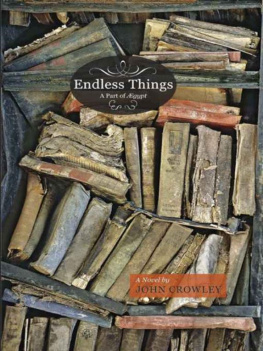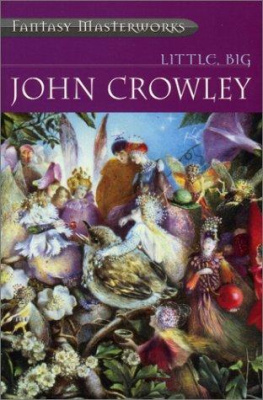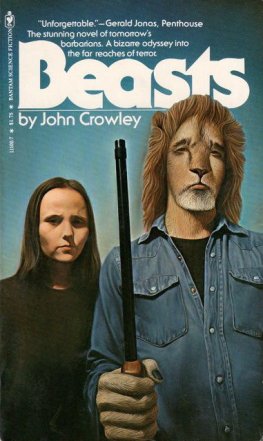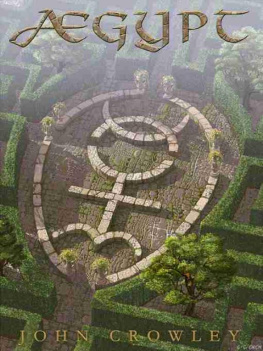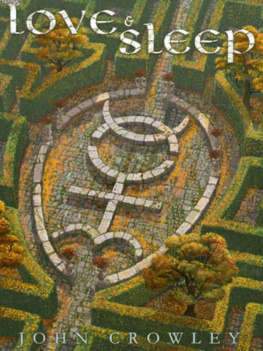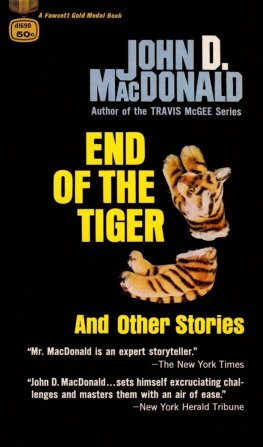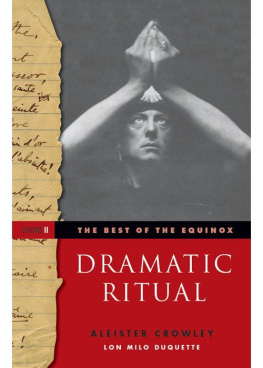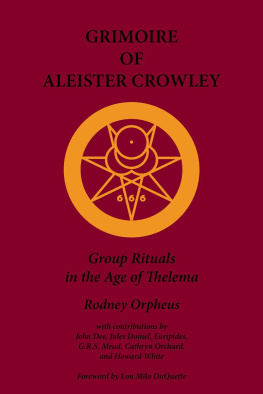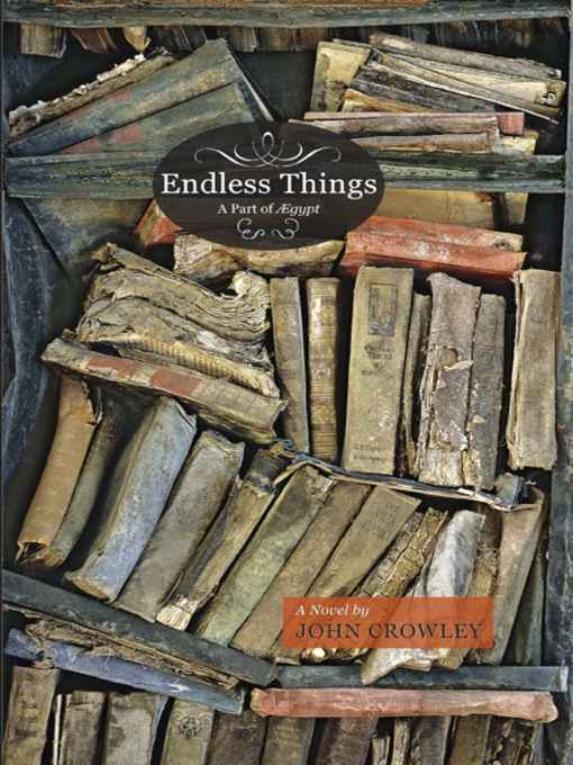Small Beer Press
www.lcrw.net
Copyright 2007 by John Crowley
First published in 2007, 2007
NOTICE: This work is copyrighted. It is licensed only for use by the original purchaser. Making copies of this work or distributing it to any unauthorized person by any means, including without limit email, floppy disk, file transfer, paper print out, or any other method constitutes a violation of International copyright law and subjects the violator to severe fines or imprisonment.
Endless Things
a part of
GYPT
John Crowley
This is a work of fiction. All characters and events portrayed in this book are either fictitious or used fictitiously.
Copyright 2007 by John Crowley. All rights reserved.
Small Beer Press
176 Prospect Avenue
Northampton, MA, 01060
www.smallbeerpress.com info@smallbeerpress.com
Distributed to the trade by Consortium.
Library of Congress Cataloging-in-Publication Data
Crowley, John, 1942
Endless things : a novel / John Crowley.1st ed.
p. cm.
"Being the fourth part of Aegypt."
ISBN-13: 978-1-931520-22-5 (alk. paper)
ISBN-10: 1-931520-22-4 (alk. paper)
I. Title.
PS3553.R597E53 2007
813'.54dc22
2006102023
Cover art 2007 Rosamond Purcell. From Bookworm by Rosamond Purcell, published by The Quantuck Lane Press.
"But then, I said, feeling a bit bemused, would we have to eat again from the Tree of Knowledge, in order to fall back into the state of innocence?"
"Of course, he answered. That is the final chapter of the history of the world."
Heinrich von Kleist
"On the Marionette Theatre"
I
REGNUM
Y-tag was the designation that Hitler and the German high command gave to the dayit was September 2, 1939on which they had determined to send their forces across the border into Poland. I don't know if this was the strategists usual way of naming such a day, or was only invented for this day of this year. Y-tag: a juncture, a crossroads that could not ever afterward be returned to.
The weather was beautiful in that season of that year, endless hot golden stasis of possibility and sweetness: everyone remembers. In New York City the World's Fair was open, Building the World of Tomorrow, and Axel Moffett went out with Winnie Oliphant in late September, along with Winnie's brother Sam and Sam's new wife, Opal. There was a special subway train that took them out from Grand Central, an express that stopped at its own brand-new station right at the Fair's gate. Tickets to the Fair cost seventy-five cents, but Axel noted that you could spend as much as five dollars for a book of tickets to all the big shows and a lunch too. Let's just get in, said Sam.
Sam and Opal, living in Kentucky, hadn't met Axel Moffett before; he had been courting Winnie for some time, and she had been writing funny little disparaging notes about him to Sam in Kentucky, who said to Opal that he thought maybe the lady doth protest too much. Axel lived in Greenwich Village, and had met Winnie in Union Square, near where he worked and she was trying business school. They both liked to get a frank from a cart for lunch on nice days. Sam and Opal had come north in Sam's old Buick so Opal could meet the Oliphant family. Opal was pregnant already. I hope it's a girl, she said when Winnie touched the dove gray gabardine over her stomach.
Axel bought a guidebook, whose cover showed the Trylon and Perisphere, and a white city, and crossing searchlights illuminating little airplanes. He searched in its pages, falling behind the others and then hurrying to catch up on his oddly small and well-shod feet. They came to the center, the Theme Center. The only all-white buildings at the Fair, Axel read, and they looked up and up, shading their eyes, at the impossibly slim, impossibly aspiring thing. Inside the great white sphere there was a model city of the time to come, a small World of Tomorrow inside the big one. The line of people who had come from all over the country and the world to see it wound up the white ramps and bridges and stairs in their hundreds to the little door that gave into the sphere. Too long, said Sam.
"We came on too nice a day, Opal said. We should have come in the rain. They all laughed, because rain seemed so unlikely here; here the sky would always be this azure.
"Well, it is the Theme Exhibit, Axel said wistfully. He read from the guidebook: 'Here in the Democracity exhibit we are introduced to the tools and techniques necessary to live full lives in the world to come.
"We'll just have to take our chances, I guess, Sam said. Where now?"
"I'd like to see the Kentucky exhibit, Opal said loyally.
"I don't think there is one, Axel said. Not every state has one."
Everywhere they wandered they saw things vastly oversized, as though brought back from some titanic elsewhere by explorers, like King Kong. The cash register that counted the visitors to the Fair, as big as a cottage; an auto piston, working away obscenely; the world's largest typewriter; a giant bank vault door; the worker with his flame held aloft atop the tower of Russia's building. USSR, said Sam. Not Russia."
"So what do you think? Opal asked Sam, taking his arm and glancing back at Winnie and Axel coming along behind.
"Well, said Sam. I don't think he's the marrying kind."
"Oh Sam."
"I don't think so, Sam said, smiling.
"She's taller than he is, Opal said. Axel had stopped to light Winnie's Old Gold, though he didn't take one himself; he shook out the match with care. That's always a little tough."
"Is that so? said Sam, still smiling.
It was the cleanest public place they had ever been in. The thousands of well-dressed people walked or rode in little teardrop-shaped cars or took pictures of one another in front of gleaming buildings of white and pale pink and citron. Best dressed of all were the Negroes, in groups or couples, bright frocks and spectator shoes and wide hats like flowers. Opal took Sam's hand and glanced up at him (she was small, he was tall) and they were both thinking (not in words) that there really was going to be a new world, and maybe it wouldn't be possible to stay and raise a childchildrenin the Cumberland highlands of Kentucky where nothing changed, or seemed only to get worse. No matter the pity and commitment you felt.
"Where now? said Sam.
There were a hundred maps of the World of Tomorrow, all of them a little different. Some showed the buildings standing up in perspective, the spire and sphere, the strange streamlined shapes. Others showed the plan of colors, how each sector had its special color, which grew deeper the farther you got from the white center, so you always knew where you were. There were maps engraved on stone and maps on the paper place mats of the restaurant, blotted by the circles of their frosted glasses.
"Maybe Axel and I should head over to the Congress of Beauties, said Sam, who had taken Axel's guidebook and bent back the cover as though it were a Reader's Digest. 'A tribute to the body beautiful,' he read. 'In a formal garden and woodland, there is room for several thousand people to view the devotees of health through sunshine.
"Sam, said Opal.
"It's okay, he said, grinning at Axel. I'm a doctor. I'd be there if you fainted, too."
In the AT&T Building they took a hearing test and tried the Voice Mirror that let them hear their voices as others heard them; they sounded thin and squeaky in their own ears, even Axel's, which was studiedly rich and low. In the Demonstration Call Room, Opal was chosen by lot to be one of those allowed to make a telephone call to anywhere in the United States, no part of it unreachable any longer.

